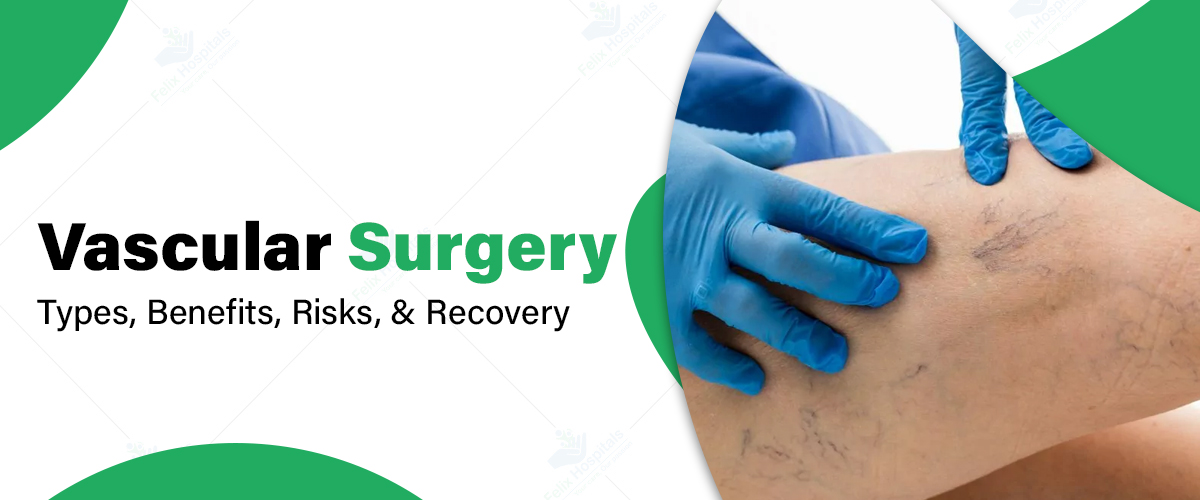
Subscribe to our

Vascular surgery could simply be described as the branch of surgery that deals with anatomy of vessels, arteries or veins or and the treatment of the blood vessels or lymphatic vessels. These surgeries are aimed at the treatment of blood vessels pathology including atherosclerosis, aneurysms, the varicose veins and other pathologies of the blood vessels. These techniques are from simple non-invasive procedures to major surgical procedures through vessel reconstruction whereby the vascular surgeons restore the arteries or veins.
If you're dealing with vascular issues, don't wait—consult with our Expert Vascular Surgeons today. Contact us now +91 9667064100.
Vascular Surgery is a really unique section of the general field of surgical medicine – it is generally marked by given operations that can be considered as related to specific diseases only. Here are some of the most common types:
Here are some of the most common types:
1. Angioplasty and Stenting: This kind of treatment is not invasive and requires the use of a balloon so as to expand blood vessels that are blocked. In some cases the wire mesh tube known as the stent is positioned within the artery so as to keep the artery open and to retain the flow of blood.
2. Aneurysm Repair: This surgery is performed where there is an aneurysm, this is the state where there is a failure of the vessel wall. To stop the walls from becoming weak, and possibly rupturing, surgeons use a graft or a stent-graft.
3. Carotid Endarterectomy: The following is the process which is used to remove clumps in the blood vessels in the neck area known as carotid arteries to prevent STROKES from happening. This is especially the case for patients with severe stenosis, that is, when the arteries are most narrowed down.
4. Varicose Vein Surgery: Some of the surgical operations in the subjects with painful and ‘abnormal-looking’ varicose veins are vein stripping, sclerotherapy or endovenous laser therapy for the blockage or removal of the veins.
5. Bypass Surgery: As a heart bypass surgery mission, the vascular bypass surgery mission involves creating a new path of blood flow by the usage of graft which is normally an artery from another part of the body.
6. Endovascular Surgery: This can be accomplished through catheters used to access the diseased vessels while treating it internally and by making minor cuts so as to optimize the number of days that it will take to heal or be closed.
Vascular surgery offers numerous benefits, particularly for those suffering from severe vascular conditions. These benefits include:
As with any operation in the body, vascular surgery has some risks that are detailed as follows. It’s important to discuss these risks with your healthcare provider before undergoing any treatment: These are the risks that should be explained to the healthcare provider before one undergoes any treatment:
The recovery times may also differ depending with the vascular surgery that has been conducted. However, most patients can expect the following during their recovery: However, it is due to these complications that during their recovery most patients are likely to experience the following:
Dr. Ritesh Agrawal is renowned for his expertise in managing complex vascular conditions. With his personalized approach to care, he tailors treatments to each patient's unique needs, ensuring optimal outcomes and enhanced quality of life post-surgery.
Schedule a consultation +91 9667064100 with our top vascular surgeons today and start your path to better health.
Vascular surgery plays a vital role in treating and managing a variety of vascular conditions, from blocked arteries to aneurysms. While it offers significant benefits in terms of improved circulation and reduced risk of serious complications, it’s important to be aware of the potential risks and the recovery process. By working closely with experienced vascular surgeons and following their guidance, patients can achieve positive outcomes and enjoy a better quality of life.
1. What conditions require vascular surgery?
Vascular surgery is needed for conditions like blocked arteries, aneurysms, varicose veins, carotid artery disease, and peripheral artery disease (PAD).
2. Is vascular surgery always necessary for vascular conditions?
No, not all vascular conditions require surgery. Some can be managed with lifestyle changes, medications, or less invasive treatments.
3. How long does recovery from vascular surgery take?
Recovery time varies based on the type of surgery. Minimally invasive procedures may have shorter recovery periods, while more complex surgeries may require several weeks.
4. What are the risks associated with vascular surgery?
Risks include infection, blood clots, bleeding, and reactions to anesthesia. It’s important to discuss these risks with your surgeon beforehand.
5. Can vascular surgery prevent strokes?
Yes, certain procedures like carotid endarterectomy can reduce the risk of stroke by removing plaque from the carotid arteries.
6. Will I need to take medications after vascular surgery?
Depending on your condition, you may need to take medications to prevent blood clots, manage blood pressure, or control cholesterol levels.
7. What lifestyle changes are recommended after vascular surgery?
A heart-healthy diet, regular exercise, quitting smoking, and managing stress are key to maintaining the benefits of vascular surgery.
8. How do I know if I need vascular surgery?
Your doctor will evaluate your symptoms, medical history, and the severity of your condition to determine if vascular surgery is the best option.
9. Are there alternatives to vascular surgery?
Yes, alternatives may include medications, lifestyle changes, or non-surgical procedures like angioplasty. Your doctor will discuss all available options with you.
The recovery times may also differ depending with the vascular surgery that has been conducted. However, most patients can expect the following during their recovery: However, it is due to these complications that during their recovery most patients are likely to experience the following: